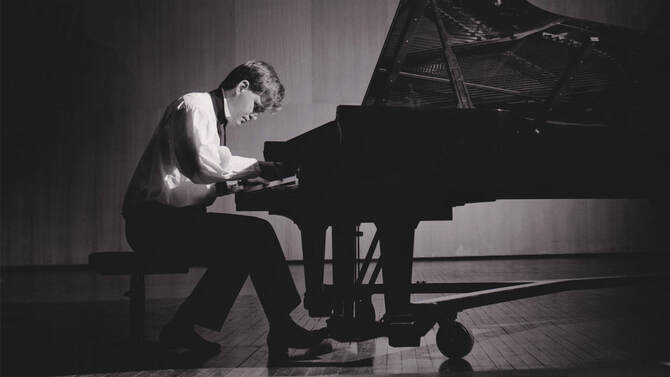THE EULOGY
****
Director: Janine Hosking
Screenwriter: Janine Hosking and Katey Grusovin
Principal cast:
Geoffrey Tozer (in archival footage)
The Hon. Paul Keating
Richard Gill
Peter Tozer
Country: Australia
Classification: M
Runtime: 103 mins.
Australian release date: 10 October 2019
Previewed at: Palace Central Cinemas, Sydney, on 27 September 2019.
The Eulogy, a new documentary about the acclaimed Australian pianist Geoffrey Tozer, begins with ex-Prime Minister Paul Keating recreating the incendiary address he gave at a memorial service for Tozer in October 2009, hence the film’s title. The musician died prematurely at the age of 54 and, in his speech, Keating described Tozer as an artist of similar stature to the great Australian names of Melba, Grainger and Sutherland. He excoriated the Melbourne and Sydney Symphony Orchestras for their treatment of Tozer, saying, “The people who chose repertoire for those two orchestras and who had charge of the selection of artists during this period should hang their heads in shame at their neglect of him... If anyone needs a case example of the bitchiness and preference within the arts in Australia, here you have it.” And it is true that Tozer rarely performed with those orchestras, despite being internationally recognised as a virtuoso pianist. Using Keating’s provocative words as a starting point, the documentary sets out to examine Tozer’s life and legacy.
Conductor and music educator Richard Gill undertakes this examination, interviewing various people who knew Tozer professionally and personally, beginning with the curator of the pianist’s estate (supporting Keating’s thesis is the fact that Tozer’s memorabilia, comprised of thousands of drawings, photographs, letters and diaries, is stored in a backyard shed in suburban Melbourne). As a child prodigy encouraged by his music teacher mother, Veronica, he began winning competitions and dazzling audiences at an early age and made his European debut with the BBC Symphony Orchestra aged just 15. He loved playing and had an extraordinary ‘ear’ for music, able to recreate complex pieces after hearing them only once.
Continuing his studies in Australia, England and the USA, Tozer championed the works of lesser known composers and became a leading exponent of the compositions of the Russian pianist Nikolai Medtner. He was also the first Western artist to perform the Yellow River Concerto in China, which he did to great acclaim. Despite all this, and his numerous recordings for the Chandos label, which included the complete piano concertos of Medtner and solo works and concertos by Schnabel, Korngold, Gerhard, Respighi, Rawsthorne and Busoni, he was frequently impoverished. In Australia, his financial struggles came to the attention of then PM Keating, who inaugurated the Creative Fellowship grants as a way of providing for artists in a similar position and Tozer was a double recipient of a Fellowship (the film points out that the first government of John Howard abolished those subsidies on election).
Janine Hosking’s doco looks at the life of the man behind the piano, too, and reveals that he was completely lacking in life skills and virtually unable to look after himself after the death of his mother. In fact, he barely had a childhood or any social contact because he practised for hours a day and Veronica did everything for him. A gay man, he loved his wine and became an alcoholic in later life, which impacted on his personal relationships and was ultimately a factor in his early death.
The Eulogy is a thoroughly well-researched work and the wide-screen format makes good use of animated segments and clever montages to illustrate its findings. Its interviewees are pertinent and open up under Gill’s mild-mannered approach and the film incorporates some excellent archival material, including footage of Tozer at various times throughout his illustrious career. Do Hosking and Gill agree with Keating’s damning assessment of the treatment of this grand master of the piano? Let’s just say that there are both black and white keys on a keyboard and their notes combine to form a whole concerto. It’s an intriguing composition that will reward any listener.
